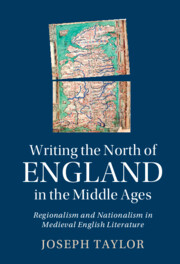 Writing the North of England in the Middle Ages
Writing the North of England in the Middle Ages Published online by Cambridge University Press: 08 December 2022
Chaucer efficiently mimics northern English dialect in the Reeve’s Tale, and critics tend to see these imitations as attempts by the poet at linguistic realism or comedy, but Chaucer uses the North of England as setting in four of the eight stories from the Canterbury Tales that arguably take place on English soil. Chaucer does not view the North simply as a cultural “other”; he knew the region well through his own travels and through the many political relationships he maintained during his career as a bureaucrat. Chapter 4 argues, then, that while Chaucer engages base northern stereotypes at the surface of the Reeve’s Tale, this engagement betrays a more pronounced northern consciousness in Chaucer’s work than critics have previously noticed. Critics are not wrong to discuss Chaucer as a European author, but, this chapter contends, we must also recognize him as an English poet who understood the complex negotiations of nation that were taking place in England in the late-fourteenth century.
To save this book to your Kindle, first ensure [email protected] is added to your Approved Personal Document E-mail List under your Personal Document Settings on the Manage Your Content and Devices page of your Amazon account. Then enter the ‘name’ part of your Kindle email address below. Find out more about saving to your Kindle.
Note you can select to save to either the @free.kindle.com or @kindle.com variations. ‘@free.kindle.com’ emails are free but can only be saved to your device when it is connected to wi-fi. ‘@kindle.com’ emails can be delivered even when you are not connected to wi-fi, but note that service fees apply.
Find out more about the Kindle Personal Document Service.
To save content items to your account, please confirm that you agree to abide by our usage policies. If this is the first time you use this feature, you will be asked to authorise Cambridge Core to connect with your account. Find out more about saving content to Dropbox.
To save content items to your account, please confirm that you agree to abide by our usage policies. If this is the first time you use this feature, you will be asked to authorise Cambridge Core to connect with your account. Find out more about saving content to Google Drive.